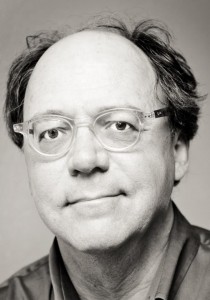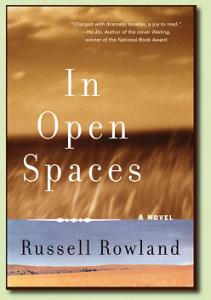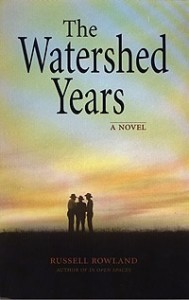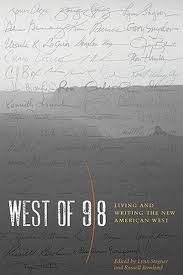 Today I am interviewing my own EDITOR for this blog post! (What was he thinking agreeing to this golden opportunity for ME? Wait a minute—what was I thinking? He could triple my rates!)
Today I am interviewing my own EDITOR for this blog post! (What was he thinking agreeing to this golden opportunity for ME? Wait a minute—what was I thinking? He could triple my rates!)
In all seriousness, Russell Rowland is a successful, extremely talented writer as well as having one of the best eyes for “seeing” the writer’s voice of most I know. The biggest endorsement I can give, quite honestly, is that I trust him with my work. I can share this with you here: I use 95%+ of what Russell suggests to me, not because I am way off or he has a completely different direction that works better but rather because he gets in tune with the writer with whom he’s working, delivering a truly personal touch.
Russell Rowland has an MA in Creative Writing from Boston University, where he also did an internship at The Atlantic Monthly. His first novel, IN OPEN SPACES (Harpercollins) earned a starred review from Publisher’s Weekly and made the San Francisco Chronicle’s bestseller list. The sequel, THE WATERSHED YEARS (Riverbend) was a finalist for the High Plains Book Award for fiction. He was co-editor, along with Lynn Stegner, of an anthology of essays and poetry (WEST OF 98, University of Texas Press) exploring what it means to be a Westerner. His third novel, HIGH AND INSIDE, will be released this summer. He currently teaches at Montana State University-Billings, as well as online with The Loft. He also does private consultation with many writers.
So, now that Russell has made it through the bear traps I leave surrounding the studio (and then forget to disarm before the guests arrive), let’s move on with the interview!
RoW: First, I’d like to thank you for agreeing to join me here at the Rob on Writing (RoW) studios. I’m hoping the directions for the seventeen or eighteen miles once you left the paved roads were adequate.
RR: I missed that turn by that fourth mailbox, so I ended up lost for about a half hour, but I made it.
RoW: Good thing you didn’t stop by Millie Hatchet’s place for directions. Let’s just say she’s earned her name. You and I met in a place some would call fortuitous: writing class; you being the professor. As I recall it, I was your star pupil. Comment?
RR: I recognized your brilliance from the first paragraph, Mr. Guthrie. Honestly, I was completely taken with your work from the beginning, and of course a lot of that had to do with the region we share. But I thought the way you wrote about grief in particular was absolutely powerful. So yes. You were the teacher’s pet.
RoW: Wow, I’m starting to like this idea better by the moment. A more serious question. Have you always had the writing desire and/or knack or did it bloom later?
RR: I actually was a bit of a late bloomer compared to some. I wasn’t even much of a reader until my mid-twenties, but once I started reading fiction for pleasure, I ate it up. I fell in love with the Russian novelists, Salinger, and Vonnegut, so I had varied tastes. Eventually I discovered Raymond Carver, and when I read his work, I decided I wanted to be a writer. I’m not sure now what it was about his writing that made me believe I could do this, but that’s how I felt. I went out and bought a used Royal Typewriter. So this was a while ago.
RoW: I will admit to also beginning on a typewriter albeit electric. Have you found being a traditionally published author at all a challenge and/or has it changed the way you operate in this new age of digital publishing?
RR: Well, I’m not sure how traditional I am, really. My idea of a traditionally published author is someone who gets their first book published, then stays with the same agent and publisher for years and years. These days, there aren’t that many authors who get to experience that kind of consistency. My third novel (HIGH AND INSIDE) is coming out this summer, and none of my novels have been published by the same publisher. I’ve also found the publishers for each of my novels without the help of an agent. Which is odd, because I always tell my clients that it’s virtually impossible to get a book published without an agent these days. That’s true, but my path has been unusual. So far my luck with agents has been a little sketchy. Ánd I’ve had some wonderful agents…people I loved. But they couldn’t sell my work. I’m actually looking for a new one as we speak.
RoW: I love your writing, it is truly phenomenal, but I have to be honest and say I love even more the way you assist in me getting my words just right. It’s a truly symbiotic editor/writer relationship. As an editor, is every experience unique?
RR: Thank you, Rob. I really appreciate that coming from you. Every experience is definitely unique, although I do try to establish that kind of working relationship where the writer feels as if we’re working together rather than having me approach them as the expert. Hell, I learn as much from reading other peoples’ work as they do, so I don’t have to pretend like it’s a team effort. That’s really how I experience it.
RoW: I know quite a few editors who write, but few who are as successful on the “writing” side as you. You had to know the question was coming: writing or editing, if it ever came down to it?
RR: Oh, I’d pick writing in a heartbeat if I could afford to make a living at it, although I love working with other writers. I’m not even sure I considered myself an editor until I co-edited the anthology with Lynn Stegner a couple of years ago. But I’ve been working privately with other writers for over ten years, so I guess I’ve been an editor for a while now. I like to tell people that I have the best job in the world. I get to read and tell people what they’re doing wrong all day…my two favorite pasttimes. But writing is what I love most. I actually think I’m fortunate that I haven’t reached the level of success where I can live on writing alone, because I need contact with other people, and if I was writing all the time, I would probably just disappear from the outside world. Isolation is very dangerous for me, and working with other writers gives me the best kind of connection with people. Í’ve had clients all over the world, so I’ve had the opportunity to meet people from every walk of life.
RoW: I know what you mean about the isolation thing. It actually segues into my next question: you and I are both Rocky Mountain men (if not Mountain Men, which would have been a rough way to spend the first 15-25 years of your life before being eaten by something bigger than you and then gnawed on for months by things much smaller than you); is your connection to the west and the mountains part of what feeds your muse?
RR: It’s an essential part of my work, and I know you can relate to this because it’s a huge part of what your stories explore as well. I went to graduate school in Boston, at BU, and for the first six months I was there, I was writing these four and five page short stories, trying to trim everything to the bone, like Carver. And then one day I started writing a story about something that happened on my grandparents’ ranch when I was a kid, and the words just started pouring out. That story ended up being about twenty pages long, and I was off to the races. It was weird. Six months later, I had the first draft of my first novel, IN OPEN SPACES, which is loosely based on the history of my mother’s family, who were homesteaders in Eastern Montana. And every novel I’ve written since then has been set in the West, although I try to drop in a scene from other parts of the country when I can.
I’ve had the opportunity to live in twelve different states in my adult life, so I’ve experienced a lot of what the United States has to offer. And I’ve enjoyed every place I lived for different reasons. But the West is where I belong. It shaped the kind of person I am, and I felt it very viscerally when I was living in other places, especially back east. I loved New England as much as any other place I’ve ever lived, and that includes San Francisco, Seattle, and Savannah, Georgia. But I have always known that I would return to Montana someday.
RoW: Not sure how it makes you feel but I’m not big on the “what’s your favorite marine mammal” type interview questions. I could care less if Stephen King prefers coffee or tea. I wanted to have you here because you’re a damn fine writer and I think my readers would benefit greatly from knowing your editor skills are for hire. This is where I let you loose for your pitch (and with full blessing, because people should know I wouldn’t trust just anyone with my words—the most important thing in my world, aside from my wonderful wife and crazy dogs).
RR: I don’t think I’ve ever had the opportunity to pitch my editorial services, so this is kind of new. I started teaching creative writing when I was in grad school, in 1993, so I’ve been teaching a long time. And most of my teaching has been online, so it was a natural progression from there that a lot of people hired me to work privately with them once the workshops ended. And it’s just grown from there. I suppose I’ve worked with over 100 people now. I focus on every aspect of the craft of writing, from grammar to theme, character development to setting. And if things go really well, I am not hesitant to refer someone to one of my agent friends. I’ve been lucky to see many of my clients get published, including Mr. Guthrie!
RoW: An inspiration just hit me (not always a good thing; we’ll soon see): is there anything YOU would like to ask ME? (I’m hoping this doesn’t end up like the knock-knock joke where you have the other guy start it and then say “who’s there” and then sit in uncomfortable silence).
RR: What is the most rewarding part of getting your work out there and hearing from people that have read your novels?
RoW: To be honest, the first experience I had a reader told me about my writing helping them through a difficult time in their life. It doesn’t get better than that. I honestly appreciate every reader, as I know you do also. Okay, I want you to know I didn’t lie about my feelings regarding non-writing-related questions in an interview about writing, but I never said I wouldn’t ask one (gotta keep all the reader’s satisfied). Let’s finish with a doozy:
Coffee or tea?
RR: I drink way too much coffee, mostly iced lattes. Real Montana man, right!
RoW: Another coffee-drinker. I knew there was a reason (other than your talent) that drew us together! Well this is my chance to plug you and I know what humble guy you are, so I am going to tell my fellow writers this: Russell will amaze you with the insight he brings to the table. I actually reached out to him after our class together because I was so astounded by the measure he added to my words. He doesn’t bleed all over your page, nor condescend—rather he compliments you to show your strengths and he gives examples when he believes your writing can be stronger.
I learn best by example, as do most, and Mr. Rowland is the best editor I’ve met in being able to get in touch with the actual work of the writer.
I recommend you check out his written work as well as consider him as a candidate to assist you with yours (I honestly feel I’m letting a secret out of the bag with Russell but he deserves it; he really is a student of the craft but he also has a way about him that tailors his help to the individual writer.
If you’d like to explore the possibility of working with Mr. Rowland on your writing, just click HERE.
I’d like to thank Mr. Russell Rowland for agreeing to take time out of his busy day to answer my (sometimes sarcastic) line of questioning. In all seriousness this writer has a true editorial gift and if you are looking to move your writing up to the next level, I can think of no one I’d recommend more.
Russell’s Books and a collection of Western Writers / Anthology he put together along with Ms. Lynn Stegner:






Thanks for sharing your valuable resource, Rob.
Keep up the good work, gentlemen.